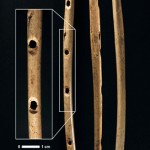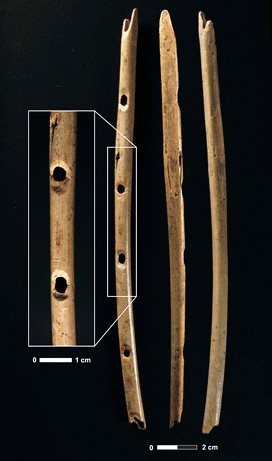What is music? We hear it every day, whether it is on the bus, in a store, or just in our headphones at home. We can use it to motivate our workout, or just lie back and listen to. But what is it exactly? “Music is sound arranged into pleasing or interesting patterns”(Tunks), and is often used to express feelings and ideas, and to entertain and relax.
Music has existed from over 50,000 years ago. Cave paintings which are believed to be dated back from this time show signs of music along with dance. Musical instruments are one of the oldest human-made artifacts archaeologists have found (Levitin 256). Here is a video of music history from 50,000 years ago to electronic music in 7 minutes:
The oldest instrument found in 2008 was a flute made from the naturally hollow wing bone of a griffon vulture, and is believed to be dated back to 40,000 years ago (Owen pars. 2,4). Drums have probably been used before then, and singing goes back even further.

It may not look like much, but it is possible to make music out of these bone flutes, even if it isn’t particularly pleasing to the ear.
Why has music stuck with humans for so long? They’re are several different ideas out there:
Steven Pinker argued that music was just “Auditory cheesecake”, meaning that people enjoyed it in the same way they enjoyed cheesecake, and it didn’t have any use or evolutionary benefits. He said that language was an adaptation humans made, and music was just a spandrel, or byproduct of it. However, others argue that because music has existed for such a long time, it must have some sort of evolutionary value. Darwin suggested that music could exist for sexual selection. He said that music was similar to mating songs and dances of other animals. He thought by being able to sing or play an instrument, males would have a better chance with a female. If you think about how girls go crazy at boy concerts, Darwin’s theory starts to make sense. Supporters of this theory suggest that being able to produce music shows coordination, determination, good hearing, and maybe even stamina, which are desirable traits. Norman Geschwind, an american behavioural neurologist, believed “music ability is a genuine predictor of male reproductive prowess because both are promoted by high levels of foetal testosterone”. He believed that the ability to reproduce and the ability to play music are both caused by high levels of testosterone. It could be the human equivalent to the peacock tail: it’s useless but shows a sign of good genes (Ball 20).
More ideas for why music exists:
- Social bonding and cohesion
- Some suggest that music could’ve been the activity that prepared our human ancestors for speech communication. Others say music exercises the brain and helps infants prepare for language. Their evidence for this is that infants come up with sentences themselves, instead of mimicking what others say. Therefore they must have some sort of structure they follow to form sentences. The people that support this claim say that music helps them form this structure.
Whether or not music has any evolutionary benefits, it deserves to be appreciated in its own right.
Do you agree with Darwin? Why do you think music exists? Please leave your comments below
